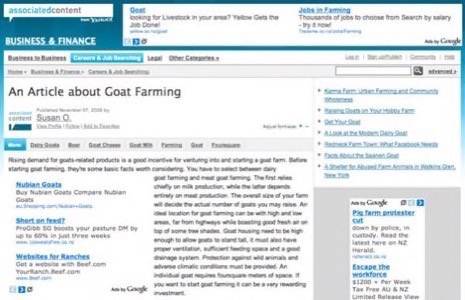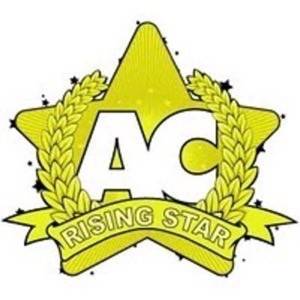Two months ago, Yahoo! acquired Associated Content for an estimated $90-100M. Over the past few years, Associated Content has become one of the most prolific content farms (companies that churn out hundreds or thousands of new pieces of content every day). It produces 10,000 new pieces of content per week, which averages out to about 1,500 per day. This isn’t as big an output as Demand Media, which at last estimate is doing 7,000 pieces of content per day. But it’s three times as large as Suite101, which we profiled yesterday.

The acquisition increased the number of pages Yahoo! has on the Web by over 10% and brought Yahoo! back into the original content game, albeit in a largely unbranded way at this point. Let’s look at how Yahoo! has been using its new farm…
Yahoo! immediately increased its content base by over 10% with this acquisition.
Yahoo! has begun to integrate Associated Content into its network of sites. A post this week on the Associated Content blog notes that content from contributors has appeared on Yahoo! News, Y! Finance, Y! Sports, and other purple properties.
However, the bulk of Associated Content’s content and value continues to reside on associatedcontent.com and is surfaced through search engines. According to an EConsultancy interview with Associated Content CEO Patrick Keane back in March, 80-90% of its estimated 16 million monthly visitors arrive at the site through a search engine. This high percentage has been normal in the content farming industry for a long time – when we interviewed About.com’s CEO in 2006, 80% of About.com’s traffic was from search.

Is Yahoo! Getting The Quality it Expects?
Quality – or lack thereof – is the number one complaint about content farms. In this respect, Associated Content appears to be at odds with what Yahoo! wants.
In the EConsultancy interview (which was before Yahoo! acquired the company), CEO Patrick Keane admitted that “quality is often irrelevant to consumers.” Instead, he said at the time, consumers are wondering “was it useful? Did it satisfy my needs? If the user gets value, then that works for them.”
Quality may be irrelevant to Associated Content’s users, but it isn’t for Yahoo!. In its Q2 results announcement, Yahoo! states that Associated Content was acquired in order to extend its ability “to provide high quality, personally relevant content for the benefit of its users and advertisers.”
Opportunities for Writers, But Low Pay
It’s easy to be cynical about the quality of content from Associated Content (after all, its CEO is). However the content is undoubtedly proving useful to Yahoo! and its network of content properties, which are still viewed by a massive audience.

The articles that make it onto Yahoo! News, Sports and other properties, come from the cream of the Associated Content crop of writers. Clearly some of them will turn out to be talented writers who can write compelling news-style content. Associated Content honors “rising stars” every month, which is good recognition and encouragement. So there are opportunities for contributors. Plus, as a freelance writer who has written for Demand Media argued in ReadWriteWeb back in December, there is a certain freedom in writing for such sites.
On the other side of the coin, it is very low pay. John Reinan of the blog MinnPost.com recently did a trial as an Associated Content writer, penning an article on accessible home design for aging baby boomers. It seems that the trial was unsuccessful. Reinan wrote that his article had been viewed 24 times. “At Associated Content’s going rate of $1.50 per 1,000 views,” Reinan complained, “I’ve made 4 cents so far.”
Yahoo! Brand
All things considered, the acquisition has been a successful one for Yahoo! – despite concerns over quality of content. It gave Yahoo! access to 380,000 contributors and it was important strategically for Yahoo! to produce original content to complement its syndicated news sources.

Yahoo! also immediately increased its content base by over 10%, with this acquisition. Associated Content currently has 20.3 million pages indexed in Google and Yahoo! has 166 million. Over time we may see more Associated Content pages branded as Yahoo! content. Or perhaps it will continue to just be the ‘quality’ content that makes that transition.
That seems the biggest risk of this acquisition, that Yahoo! will eventually sully its image as a media portal with poor quality content.

















